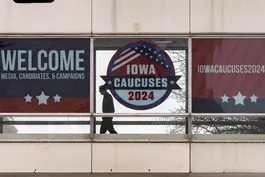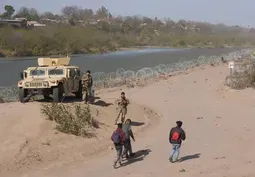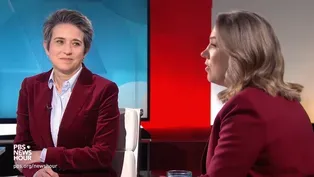
Iranian-backed groups raise threat of wider Mideast conflict
Clip: 1/15/2024 | 5m 19sVideo has Closed Captions
Iranian-backed groups raise threat of drawing U.S. into a wider Middle East conflict
Since the Oct. 7 Hamas attack and Israel’s military response in Gaza, Iranian-backed militias in the region have escalated attacks. Hezbollah and the IDF have traded barrages while the Houthis have lobbed missiles and attacked ships in the Red Sea and Gulf of Aden. Amna Nawaz discussed Iran’s objectives and influence with Karim Sadjadpour of the Carnegie Endowment for International Peace.
Problems with Closed Captions? Closed Captioning Feedback
Problems with Closed Captions? Closed Captioning Feedback
Major corporate funding for the PBS News Hour is provided by BDO, BNSF, Consumer Cellular, American Cruise Lines, and Raymond James. Funding for the PBS NewsHour Weekend is provided by...

Iranian-backed groups raise threat of wider Mideast conflict
Clip: 1/15/2024 | 5m 19sVideo has Closed Captions
Since the Oct. 7 Hamas attack and Israel’s military response in Gaza, Iranian-backed militias in the region have escalated attacks. Hezbollah and the IDF have traded barrages while the Houthis have lobbed missiles and attacked ships in the Red Sea and Gulf of Aden. Amna Nawaz discussed Iran’s objectives and influence with Karim Sadjadpour of the Carnegie Endowment for International Peace.
Problems with Closed Captions? Closed Captioning Feedback
How to Watch PBS News Hour
PBS News Hour is available to stream on pbs.org and the free PBS App, available on iPhone, Apple TV, Android TV, Android smartphones, Amazon Fire TV, Amazon Fire Tablet, Roku, Samsung Smart TV, and Vizio.
Providing Support for PBS.org
Learn Moreabout PBS online sponsorshipand Iran's Revolutionary Guard Corps claimed# responsibility, according to Iranian state## media.
It's just the latest in a series of attacks# by Iranian and Iranian-backed militia across the## region since Hamas attacked Israel on October# 7 and Israel launched its response in Gaza.
Hezbollah in Lebanon and the Israel# Defense Forces have traded barrages,## while the Houthis in Yemen have# lobbed missiles toward Israel## and continue attacking ships in# the Red Sea and the Gulf of Aden.
For more on Iran's objectives and influence,## we turn now to Karim Sadjadpour, senior fellow at# the Carnegie E So, Karim, before we get into the# details of some of these groups## and their relationship with# Iran, just broadly speaking,## what's Iran's objective?
What's the strategy# here in the use of these pro KARIM SADJADPOUR, Carnegie Endowment for# International Peace: It's an important## question I would ar there have been very few governments# in the world that have had a more## clear and consistent grand strategy# over the last four or five An d there's essentially three pillars to# that strategy.
Number one, Iran is intent## on evicting the United States from the Middle# East.
Number two, they're intent on replacing## Israel with Palestine.
And, number three, they# want to help defeat the U.S.-led world order.
So, I would argue Iran and all of its regional# proxies share these -- all these three objectives.
AMNA NAWAZ: Use of those proxy militias# also gives them some degree of deniability.
The fact that they claim responsibility# for this attack on the U.S. Consulate in## Northern Iraq as quickly as they# did, what does that say to you?
KARIM SADJADPOUR: Iran has a pretty -- is# oftentimes a pretty good judge of U.S And so the fact that they are publicly claiming# credit for attacks on U.S. outposts in the region## probably means that they don't fear conflict with# the United States, because they know this is a## Biden administration which is intent on trying# to de-escalate and avert conflicts in the region.
And, in some ways, that emboldens Iran.
AMNA NAWAZ: So we know that Iran also backs# Ye men.
How is their relationship with each of# those groups different?
And how is it the same?
KARIM SADJADPOUR: Well, Hezbollah is the crown## jewel of the Iranian Revolution And it's essentially part of Iran's# Revolutionary Guards.
It's really a## wholly owned subsidiary of the Iranian# state.
The Houthis are being trained## by Hezbollah.
And over the last decade, their# relationship with Iran has grown much closer.
And so, at the end of the day, Iran doesn't# micromanage these proxies.
It doesn't call## up Hezbollah or the Houthis or the Shia# militias in Iraq and tell them what to## do on a day-to-day basis.
But it certainly# macromanages those groups.
And those groups,## as I mentioned, they share these# strategic objectives of trying to## evict America from the Middle East# and replace Israel with Palestine.
AMNA NAWAZ: But the fact that we have seen this# ramping up of the Houthi attacks in the Red Sea,## the ramping up of Hezbollah attacks# across the border with Israel,## is that being coordinated through Iran in any way?# And could they call them off i KARIM SADJADPOUR: I think there's# no doubt it's being coordinated## with the Iranian government.
Hasan# Nasrallah, the l has come out and said that all of# Hezbollah's funding comes from Iran.
We know a giant chunk of Houthi funding# comes from Iran.
Hamas' military budget,## 80 percent comes from Iran.
So this is not# simply charity that Iran is offering its## proxies.
This type of aid and support, military# support, comes with major strings attached.
So, if Iran ordered its proxies to cease# all attacks on U.S. interests on Israel,## I expect that they would do so right away.
AMNA NAWAZ: Karim, tell me about the# do is under that leads them to think# this is the right strategy KARIM SADJADPOUR: Well, the Iranian# regime is deeply unpopular.
It's## essentially a socially authoritarian# police state with a failin Very few Iranians want to continue# to live under the Islamic Republic.
But the reality is, as long as this Iranian regime# remains in power, there's never going to be real,## meaningful stability in the Middle East,# because this is a regime which really thrives## with regional instability.
The countries# we have been talking about today, Yemen,## Syria, Lebanon, Iraq, Gaza, these# are all essentially failing states.
And so Iran has more effectively figured# out how to fill power vacuums more than## any other actor in the region.
It thrives on# this instability, and so does its proxies.
AMNA NAWAZ: That is Karim Sadjadpour,## senior fellow at the Carne Karim, thank you.
Good to speak with you.
KARIM SADJADPOUR: Thank you so much, Amna
Arctic blast grips much of U.S. bringing brutal temperatures
Video has Closed Captions
Arctic blast grips much of U.S. bringing brutal temperatures and dangerous wind chills (2m 20s)
'Eve' dispels human evolution myths and female body's role
Video has Closed Captions
New book 'Eve' dispels myths about human evolution and details female body's role (6m 49s)
How a $100M donation is a game-changer for HBCUs
Video has Closed Captions
How a $100M donation is a game-changer for HBCUs (6m 20s)
Iowans face freezing temperatures in 1st contest of 2024
Video has Closed Captions
Iowans face freezing temperatures to caucus in 1st contest of 2024 campaign (10m 33s)
Rep. Cuellar on Texas border dispute after migrant deaths
Video has Closed Captions
Rep. Cuellar on border dispute between Texas, federal officials after migrant deaths (7m 5s)
Tamara Keith and Amy Walter on Iowa caucus expectations
Video has Closed Captions
Tamara Keith and Amy Walter on Iowa and the start of the Republican nominating process (8m 33s)
Providing Support for PBS.org
Learn Moreabout PBS online sponsorshipMajor corporate funding for the PBS News Hour is provided by BDO, BNSF, Consumer Cellular, American Cruise Lines, and Raymond James. Funding for the PBS NewsHour Weekend is provided by...

















